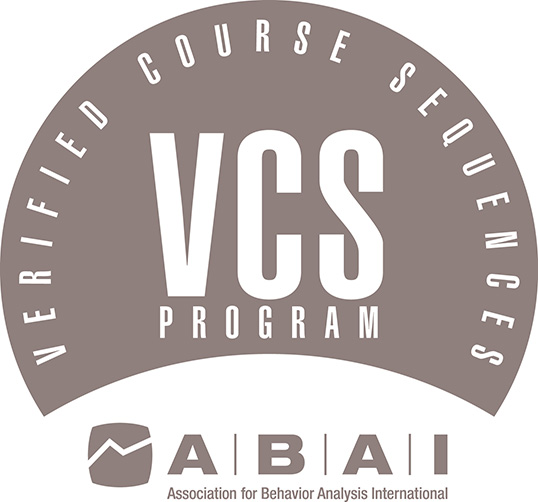
Admissions
M.Ed. in Special Education, Applied Behavior Analysis
Starting Fall 2024
- Bachelor’s degree or higher preferably in special education, education, psychology or related field. A minimum GPA of 2.75.
- Two letters of recommendation preferably one from a former professor.
- Essay stating purpose for pursuing the M.Ed. SPED/ABA degree plan including discussion of relevant experience in ABA and professional plans upon completion of the degree.
- Admitted students attend required virtual orientation prior to beginning of first semester.
More details at Admission Requirements and Student Resources.

Degree Plan
Online Program
SPED Core Classes
- SPED 6321 Introduction to Special Education
- SPED 6326 Programming & Collaboration for Students with Disabilities
- SPED 6337 Teaching Strategies for Students with ASD
- SPED 6339 Communication Strategies for Students with ASD
- SPED 6341 Applications of Single-Case Research Design in School and Clinic
- SPED 6333 Experimental Analysis of Behavior for the Educator
Major Concentration
ABA Course Sequence
- SPED 6331 Behavior Assessment and Adjustment of Exceptional Children and Youth
- SPED 6325 Applied Behavior Analysis
- SPED 6332 Principles of Behavior for the Educator
- SPED 6338 Behavior Intervention Procedures for Educators
- SPED 6340 Philosophical and Historical Foundations of ABA
- SPED 6346 Supervision and Organizational Behavior Management
- SPED 6335 Ethical and Professional Conduct for the Behavior Analyst
Total: 39 hours
Students who entered the program prior to Fall 2024 must take the Master Comprehensive Exam within six hours of completing the program.
SPED MED ABA Student Handbook
Students entering Fall 2024
Course Rotations
Fall
- SPED 6305 Educational Diagnostician Practicum
- SPED 6325 Applied Behavior Analysis
- SPED 6327 Appraisal, Instructional Coaching and Collaboration for Students with Disabilities
- SPED 6331 Behavioral Assessment and Adjustment of Exceptional Children and Youth
- SPED 6332 Principles of Behavior for the Educator
- SPED 6337 Teaching Strategies for Students with Autism Spectrum Disorders
- SPED 6341 Applications of Single Case Research Design in School and Clinic
- SPED 6345 Intellectual Assessment
- CUIN 6322 Principles of Curriculum Organization
- CUIN 6332 Education in a Diverse Society
- CUIN 6321 Principles of Curriculum Development
- FEDU 6331 Human Growth and Development
- FEDU 6321 Foundations of Education Research
Spring
- SPED 6305 Educational Diagnostician Practicum
- SPED 6321 Introduction to Special Education
- SPED 6326 Programming and Collaboration
- SPED 6331 Behavioral Adjustment of Exceptional Children and Youth
- SPED 6338 Behavior Intervention Procedures for Educators
- SPED 6339 Communication Strategies for Students with Autism Spectrum Disorders
- SPED 6341 Applications of Single Case Research Design in School and Clinic
- SPED 6344 Educational Assessment of Students with Disabilities
- SPED 6346 Supervision and the Behavior Change Program
- CUIN 6322 Principles of Curriculum Organization
- CUIN 6332 Education in a Diverse Society
- FEDU 6331 Human Growth and Development
- CUIN 6321 Principles of Curriculum Development
- FEDU 6321 Foundations of Education Research
Summer
- SPED 6321 Introduction to Special Education
- SPED 6333 Experimental Analysis of Behavior for the Educator
- SPED 6334 Diagnostic Teaching, Assistive Technology and Instructional Strategies
- SPED 6335 Ethical and Professional Conduct for the Applied Behavior Analyst
- SPED 6336 Behavior Applications: Focus on Autism and Developmental Disabilities
- SPED 6340 Philosophical and Historical Foundations of Behavior Analysis
- CUIN 6322 Principles of Curriculum Organization
- CUIN 6332 Education in a Diverse Society
- FEDU 6331 Human Growth and Development
BCBA® Credential

BACB University Pass Rates
Pass rates for first-time BCBA candidates in university training programs are published annually. Students can find the UHV Pass-rate at this link. BACB - UNIVERSITY PASS RATES Note, data are not published for training programs with fewer than 6 first-time candidates.
We offer a Masters of Education in Special Education Applied Behavior Analysis degree program at UHV, which includes an Association for Behavior Analysis International (ABAI) Verified Course Sequence that meets the coursework requirements for eligibility to take the Board Certified Behavior Analyst® Examination under the BACB Pathway 2.
Students who have a master’s degree and are interested in completing the Verified Course Sequence requirements only, apply as non-degree seeking students. Please note that the completion of the certification process to become a Board Certified Behavior Analyst® is independent of the University of Houston – Victoria.
Students seeking credentialing as a Board Certified Behavior Analyst® (BCBA) will have to independently complete supervision experience hours to qualify to sit for the exam. To view the additional supervised experience requirements set by the Behavior Analyst Certification Board ® go to their website.

Faculty
Sharon de Marin, PhD
Assistant Professor in Special Education and Educational Diagnostician Certification
Andria Young, PhD, BCBA
Professor - Special Education
SPED/ABA VCS Coordinator